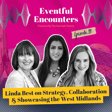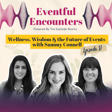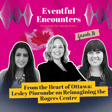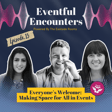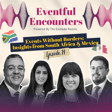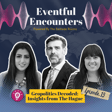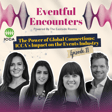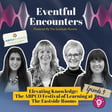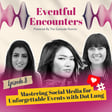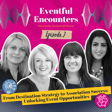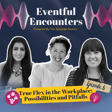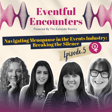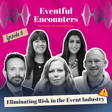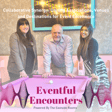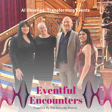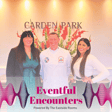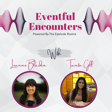Become a Creator today!Start creating today - Share your story with the world!
Start for free
00:00:00
00:00:01

Empowering Inclusion through Neurodiversity
At this year's ICCA UK & Ireland Conference in Leeds we caught up with the team launching new tools to encourage inclusion through neurodiversity at event. Listen in and learn more.
Transcript
Introduction to Eventful Encounters
00:00:00
Speaker
Hello and welcome back to Eventful Encounters. Today we're recording at the ICA UK and Ireland chapter meeting. Tanita. And Leanne. Today's episode is?
Empowering Inclusion Through Neurodiversity
00:00:10
Speaker
Oh sorry, yeah.
00:00:11
Speaker
So today's episode is all about empowering inclusion through neurodiversity. So we've got Gail with us from um the Edinburgh International Convention Centre. Conference Centre. Conference Centre. He's the head of association sales. We've also got Andy from Welcome Brain, who's the founder.
00:00:29
Speaker
And we've got Claire joining in us as well, who's the MD who is the md of her company and she is a professional conference organiser. So we've got lots of different aspects,
How to Accommodate Neurodiverse Guests
00:00:41
Speaker
different viewpoints that can help us with today's podcast.
00:00:44
Speaker
So... Tanita and I were just saying that we want to get a better understanding of how as a venue we can be more accomdate accommodating for neurodiverse guests.
00:00:56
Speaker
So we want to learn as much as we can from you three and your viewpoint. so We have had the neurodiversity checklist yeah ahead of of an event that we're hosting this year at the East Side Rooms.
00:01:10
Speaker
Tanita, you've gone through that, haven't you? and Yeah. And looked at ways that we can try and be as inclusive as possible. But you're the expert, so we want your viewpoints on how you think as a venue we can be the best we can to be inclusive to everyone.
00:01:25
Speaker
So over to you. Would you me to give a bit of backstory for where this all sort came out? Yeah, that would
Lessons from a Neuroinclusive Conference
00:01:32
Speaker
be great. Yeah. So, yeah, a few years ago at the ICC we hosted ITICOM, which is It Takes All Kinds of Minds, which is an international conference about neuroinclusivity for that. So we had 1,200 delegates and it was a real sort eye-opener for us of what we need to do to make it our venue inclusive for delegates and speakers for that and and it showed just simple things we could put into practice made such a difference as well so that was one part of it.
00:02:02
Speaker
a Other part of it, I have attended number industry conferences and there was lots of conversations about inclusivity and all very important conversations around race gender sexuality up top but I felt there was no conversations about being neuro inclusive aim and coming from a neurodivergent family aim and seeing the challenges and then i I'm always as a cell association conferences always to happen on that these are education platforms yeah and I was like so why are we not doing Educating on that. Yes, it's an it's no ongoing education platform before you do at school, but then all our conferences pretty much are coming in with big, long presentations, loads information, some quite overwhelming social programs as well, which, as say, that works for many delegates, but actually for a large percentage the population, about 20% of the population, that doesn't work when we're excluding them.
00:02:53
Speaker
am So it kind of started from that and then it just sort of grew and grew. I did a couple of presentations on ITICOM and my colleague Karen as well and then we got introduced a Welcome Brain through the Edinburgh Chamber a and then we also worked with APCO and partnership and then Claire came on to the task force and that as well and then it's kind of grown from there.
00:03:16
Speaker
Yeah, I mean, yeah, I agree with everything Gail said. So so we're a neuro inclusion consultancy. um But all of the principles we're talking about, I actually think are just fundamental principles around business. neuro inclusive event is just a good event when we're working with private businesses.
00:03:32
Speaker
They make more money if they're neuro inclusive. So so all the things we're advocating for are things that are more effective. They make events more successful and they make events better for neurotypical people as well.
Why Neuro-Inclusion Matters
00:03:42
Speaker
um So we always say there's three reasons why you should care about neuro-inclusion. is The first one is that 20% of people are neuro-divergent.
00:03:49
Speaker
So this is a sort a social justice issue. It's an empathetic and ethical issue. The second one is that it's a legal issue. You actually have to be neuro-inclusive, right? The Equality Act says that you actually have to.
00:04:00
Speaker
But the third one is that it's a profit-based decision. it makes events better. It attracts people. 85% of neuro-divergent people don't attend events if they're not neuro-inclusive. It's a huge number. couldn't believe that when you put that stack.
00:04:10
Speaker
and it' right and yeah So that's you know 16% of the total population so one in six people won't go to an event if it's not neuro inclusive. Which is huge so we're losing big numbers to events. Exactly yeah absolutely so yeah these are just fundamental principles of running good events. Yeah definitely and we found like when we were looking at accessibility last year, there were so many delegates that said actually they wouldn't be forthcoming with their accessibility requirements.
Improving Accessibility in Events
00:04:38
Speaker
So on the back of that, we changed our website to try and make it and that our venue, we pointed out how accessible we were as a venue because we found that actually people that had accessibility requirements were kind of googling the venue beforehand and just trying to find as much information as they can so now we're like right now we need to be able to do this to make it accessible for everybody and and look at like the neurodiversity and how we can be more inclusive so yeah tips like that are just
00:05:08
Speaker
I found the stats work that you presented in the session staggering. I was like, I can't believe that many people just wouldn't attend an event because they didn't find it neuro-inclusive.
Personal Reflection on Neurodiversity
00:05:17
Speaker
So we need to be better as an industry, don't we?
00:05:22
Speaker
I guess I'm coming at it from a point of view as a PCA, but also as an individual who is neurodivergent. Yeah. and I've instinctively been incorporating a lot of these things just naturally over the years and to now understand why as a relatively late diagnosed woman as well because as Gail talked about earlier you know neurodivergence in women is quite quite different to men i and so yeah just realizing that all these things that I'd
00:05:55
Speaker
just instinctively done, now there's a reason why because I was doing it for me. yeah And therefore it was benefiting a lot of my delegates at the same time. So yeah, that's another angle of coming at it really.
00:06:08
Speaker
It's like um when you were saying about the dress code earlier, we actually looked, because dress codes for events, we find them quite stressful, don't we? No matter what they are, you get everything. Smart casual, what does it black tie, like is it,
00:06:21
Speaker
proper black tie or so I do find even as a conference delegate exactly like you said we should be inclusive across the board because actually and making an event you know in that is inclusive for neurodiverse people actually for neuro atypical people as well is a great it helps everybody exactly clarity helps nobody's going to be worse off for having more clarity on what the dress code is exactly and even when you mention like intolerances and allergies and things this is why we should be labelling all our menus and they're aware of what what's in them so that people don't feel anxiety when they're coming to events and they don't feel anxious about what they can and can't eat. And making sure that the whole
00:07:01
Speaker
team you know your whole staff team understands of that you know when you say to a waitress who is no less important than somebody in the kitchen in fact she's probably more important yeah she's customer facing um she or he um you know can i just check is this gluten free and they just say i don't know you know so give equipping them with skills to say you know what i'm not sure if you I'm gonna take a note of where you are, what you're wearing, bear with me a minute and I'll come back and I'll and i'll check for you.
00:07:32
Speaker
Or better still, having on the tray a label. Yeah, exactly. That if they can't remember, they can't remember everything at least it's written there on a little label. Well we really champion this at the venue as well because my daughter actually has celiac disease so like we understand and Tanita bless it like she'll go to a restaurant and she's like they had all the gluten-free options labeled on a menu because it can be really difficult to eat out or go to venues you know if you do have intolerances
00:08:03
Speaker
and actually they can make you really quite ill. So then what I don't want is where we go to events and actually people that have dietary requirements just don't eat, which I have seen at some events as well, because they just think, I'm not sure, or the staff aren't knowledgeable. And actually,
00:08:19
Speaker
If somebody's not sure if a food item contains, like you said, you're dairy-free as well. he actually lose confidence, yeah. Oh, you don't trust them, really. And then you shut down because you're hungry, you shut down because you isolated, and it just adds to the overwhelm that you were already experiencing before you'd even tried to eat anything. yeah But then the next time you do to go to an event at that venue, would you not go or try and avoid it?
00:08:43
Speaker
because you've had a bad experience. I think it's not just venues, I think organisers need to take ownership for this as well because I think you know if you're going to put a registration form together that asks for your dietary requirements, organisers need to communicate with the venue yeah what those combinations are because like I was saying you you you're not gluten-free or pescatarian, you are both therefore there needs to be something that you know or ah or all the other combinations.
00:09:10
Speaker
So I think, you know, organisers need to look at that data that they're collecting and have a proper conversation with caterer and make sure that it's been carried through. yeah And then when you arrive on site, a reminder, you know, here's our list of, you know, okay, and there might only be five people with that dietary, but those are five people, like you say, who might not come back yeah next time because they have a bad experience and from personal experience it is not very nice.
00:09:39
Speaker
Leading on from that, how can businesses and event organisers, venues as well, create more inclusive environments for neurodivergent interval individuals? wents up Can you say the question again? Yeah, sorry. How can businesses and event organisers create more inclusive environments for neurodivergent
Neuro-Inclusivity Checklist
00:09:56
Speaker
individuals?
00:09:57
Speaker
what do we do they start with the checklist the toolkit that we've just launched i think that's so fabulous that you've done that you know because it for us it didn't have any insight we had somewhere to go and to read through that we could start working through the steps i think that is great but actually really through that i was surprised at how much we are already doing now even realizing and how many things you could easily da to end Yeah, yeah he want the jump to to and yeah um we are definitely looking at putting a quiet room in. Yeah, we've done a lot of research on that recently. Yeah, we have a ledd lighting and we have lots floods of natural daylight. So things like that. And we've looked at putting plants in and stuff like that. Yeah.
00:10:36
Speaker
And so there are quite a few things that stood out that we've already already were doing. And then there's a few that we've taken on board that we're going to try and implement. implement Hopefully that's great. April. And do you have organizers that ask, you know for example, do you have a multi-faith room? We've got one. Exactly. So not every venue does. I mean, how amazing to be able to say we have a multi-faith room, we have a quiet room. you know And that's part of your offer before they've even stepped through the door.
00:11:02
Speaker
We have said it's definitely something that we want to implement. yeah because But like you said, we have to make sure that we educate our delegates as well so that people aren't using it to go and work in there or to make calls because actually, It has to be a space that people can go to and feel comfortable that they can take some time out. I think it's good make sure you embrace it as a company as well. At EICC we now have a permanent quiet room but for staff at EICC staff, separate from daily staff, which a staff aim which has been used quite a lot by my colleagues for that. So it's really living and breathing what we're seeing as well. So yes, there's quiet space for delegates.
00:11:40
Speaker
But you've got a bit of a domestic community culture as well. And if that's a permanent space that's there all the time. And under Strict it cannot be used for any kind of meetings. or storage space. Yeah, that's what it was. But I know we've got the luxury. We are a big building. Yeah. We're not all venues. We'd have that luxury, I guess.
00:11:58
Speaker
I've come across venues that have a quiet room for the organisers. So while yours is for your staff, you've either haven't got one for delegates, but also for the PCO group or you know whoever is organising the event.
00:12:11
Speaker
And I've seen it as a difference between a quiet room and a quiet working room. Exactly. We've had conferences before that had a quiet space. and then people were just going to catch on their emails and make telephone calls and then it becomes a non-quiet space. Exactly, that was not what the point of that room was at all. aims Because even the tapping of a keyboard yeah can be really triggering for somebody that just wants to decompress and get away from everything. you know So that person thinks, well I am being quiet, but actually they're not.
00:12:41
Speaker
I mean, I think that the purpose of the toolkit is, as you say, when you look through it, you say, actually, we do do some of these things already. But to say, well, if you just did a couple more, you can package it all as one thing. yeah And to give you that impetus just to complete the the whatever section level you're on. And then you can
Step-by-Step Approach to Neuro-Inclusion
00:12:56
Speaker
start to use that in marketing and say, well, we are a silver level, gold level, platinum level, inclusive event space. I think that is that's what we're trying to do is just make it really easy for people to be neuro-inclusive. Yeah. And that's what we want to do. Try and put together like a neuro-inclusive policy.
00:13:11
Speaker
get the staff trained, have the flight spaces and all these things. So hopefully we'll get there. So obviously we've looked at the checklist but some of our listeners may not have looked at the checklist yet so we will put a link to the checklist obviously in the notes as well but can you just talk us through some of the key steps on the checklist that venues can perhaps look at and ways that they can make their venue more neuro-inclusive?
00:13:37
Speaker
Yeah, well so we have 10 different sections, so it runs it runs from soup to nuts, so it goes from when you send out that first email organizing your event to collecting the feedback at the end and all the all the steps in between.
00:13:47
Speaker
And we have three tiers, there a silver level, gold level and platinum level. And it's based, again, to remove the excuses to be neuro-inclusive, to not be neuro-inclusive. um So it covers things like making sure you're using language that's understandable by all and easy for everybody to follow.
00:14:03
Speaker
Make sure you're being cognizant of guests and delegates when they're at the event, providing good food options that are accessible to everybody. So it covers everything. ah Hopefully it's not too daunting.
00:14:13
Speaker
and And we deliberately designed the silver level so it is accessible to absolutely everybody. So it doesn't require huge amounts of money, if any money. it doesn't require a huge team, doesn't require a specific type of venue.
00:14:24
Speaker
So it's, as I said in the the speech earlier, is it's designed to be an on-ramp to neuro-inclusion. So I think, as you said, when you look through the s silver, you say, well, actually, we do do some of these already. And ah none of them are supposed to be daunting or onerous. And And there's no way that you can get it wrong as well, which I know is a fear that people have around neuro-inclusion.
00:14:42
Speaker
People think that doing it half neuro-inclusive is worse than doing it not not at all, but actually doing it half neuro-inclusive is better than doing it not at all. And people yeah do notice.
00:14:53
Speaker
yeah yeah people really will appreciate it and i think that feedback will then be the momentum that will spur people on to to to take the next step let's do a little bit more yeah but even things like trying not to write everything in capital letters you know that's one of the steps in one of your and one of the checklist because you know dyslexic people or people who have different processing things going on, find that really difficult. yeah And actually just being aware being aware yeah that people find that difficult is half of it. i mean, I've had some amazing conversations just in the coffee break of people who haven't even thought of the things that we've brought up in the session.
00:15:34
Speaker
I mean, that's job done. yeah there's absolutely you know yeah We've raised awareness and people are now thinking, okay, that and does actually apply to us and we could do that.
00:15:45
Speaker
I think that's a good point, isn't it, really? Just by raising the awareness alone, and you're making people think differently and how can we be more inclusive? And actually, yeah, when we put presentations together, just simple steps like don't put loads of capitals in there. Make sure that it's easily readable. Make sure that we've got you know food that's um inclusive for all and easily labelled on all of our buffet stations, yeah snack stations, break stations and You know, we're big advocates, aren't we, for just making sure that as a venue we can include everybody and that everybody feels welcome, you know, that they will have a great experience. I think people are most shocked about the stats about the number of people that don't attend. Yeah, can't believe that. And I think that was probably because we're in a room of people working in hospitality and who have dedicated their careers to work in hospitality and we think we're all offering a five-star service and that's what we aim to do.
00:16:35
Speaker
So think everybody's been a bit taken back going, oh, minute, why have we missed this massive bit of the market? Yeah. And then when you see it, it seems quite obvious, in of the things you need to put into place. But it's definitely sparked conversation, which is brilliant. That's exactly what we wanted to achieve today. Definitely. And you've definitely done that and given us some takeaways, even just from the session as well as the checklist. So I think it's been great. Well, and everybody who is running event, ultimately it does come
Profitability and Engagement through Neuro-Inclusion
00:17:01
Speaker
down to money. Like everybody's in a for-profit business. So realizing that you're harming your bottom line by not being neuro-inclusive is huge. That's what's going to give you the energy to actually make those changes. yeah
00:17:10
Speaker
Exactly. And, you know, if we can attract just a few more delegates by being more inclusive, then that's great, isn't it? because And they're going to bring so much to your event. Yeah, 100%. Just like because of the way that their brain works and the way they are, you know, different, as it were.
00:17:27
Speaker
um yeah it's everybody's a winner. Definitely. yeah So some key takeaways from each of you So and for our listeners, what would you say would be a great key takeaway or some simple steps to help um venues be more inclusive? So Gail, shall we start with you?
00:17:50
Speaker
yeah on spot thank a I mean, is the toolkit is very comprehensive and it's yeah yeah it's not just the venue. And as Andy said, you don't just become divergent when you're at the venue, it's the whole process. that all yeah booking the registration process, the information right from the beginning, making sure that is clear a with using the right language and dyslexia friendly and then to the speakers as well because a lot of them do a divergent as well so giving them advice on how to aim for that but then without constrain a name for their own style of presentation as well. So yeah it's the whole process all the way through, right from the beginning, and all the way through post-event and then keeping that momentum going event after event. And especially, but we work, I focus on the so association market. So it's about, I guess there's a lot talk about legacy and impact. yeah So it's trying to get these associations to instill this in their conference and then building that in future ones.
00:18:42
Speaker
Yeah, I love that. Thank you. and I mean, I'm so deep in writing in this thing that I struggle to just have one, but... yeah but You can have more than one. No, don't say that because we'll be here forever. But yeah Gail asked me earlier and I ended up doing two because I still couldn't do one. But i would say I would say that to say it in a nutshell is is ask. Don't be afraid of getting it wrong. You know, if you're when you're sending out an email saying...
00:19:04
Speaker
a little line at the end saying we're planning on making this a neuro-inclusive event do you have any comments or do you have any requests or requirements that you would have that costs nothing yeah again you're not going to get it wrong you're not going to get cancelled or get in trouble for saying that and just start the process that show that you're interested in dialogue and just begin it like that just keep it really really simple for me that's really important because everybody has different needs even if you have the same yeah Yeah, even people with the same neuro type have different experiences. yeah yeah and and that ninhi thing And it was more it was about recruiting people within our industry that neurodivergent, and they were saying sometimes in job applications, they'll put at the very bottom of the job, app well, in that position of advertising saying that we would welcome neurodivergent,
00:19:49
Speaker
people to apply for it, put it at the bottom, put that at the top, because actually if it's a massive long form, a chance I'm not getting to the bottom of that and then I'll miss that, so it needs to be right at the top and just put out there straight away and it's the same applies to conferences, right from the initial communication to see that we're neuro-inclusive event and what can we do to help you.
00:20:10
Speaker
yeah yeah love that It's almost like do the marketing part first, say we are going to be neuro inclusive, tell us how we would do that and do that first. yeah exactly i guess ah lot on on the same thread really, involving neurodivergent people in your planning. yeah yeah i mentioned that earlier on say you know Yes, involve the delegates and speakers in feeding back their specific requirements at an early stage, but you know if you're looking at how you're designing your venue and your marketing and communications and i
00:20:41
Speaker
Yeah, involve somebody in reviewing that and looking at it with a different viewpoint. And that's to give you feedback. i know yeah Simple things. Exactly. That's how you know it's a good idea. Yeah, exactly. Simple steps, but they're all achievable, aren't they? and For venues and organisers and anybody that's thinking of putting on a conference, you know,
00:21:02
Speaker
these are simple steps that they can put in their planning process that you say, Andy, like, start right from the beginning and actually we know then that and we might try to track those 20% of people that aren't coming to events. I really like the idea where a lot of venues and have a website, obviously, and there's a ah whole section on the PR sort of toolkit with, yeah you know, library of images and videos and things, perhaps floor plans.
00:21:27
Speaker
um Let's add a section to that that includes a walkthrough of how to get to your venue, you know, when you walk through the door. um where is the registration like desk where's the cloakroom where are the nearest toilets but you should say that I've just sent an email our marketing exec asking her to do exactly that good it's working because as a venue you know that's it's kind of an obvious thing to do but it's clearly not very obvious because not many people do it but you know and then as an organiser we don't then have to re
00:22:00
Speaker
we don't have to recreate that you don't have to just use the one that you've you've created um because quite often when i go on a site visit it's only me like i don't bring a film crew with me on a site visit and yeah you know i probably could do it on my phone but you know you could put something together that's branded so yeah yeah and it shows that you're invested in that And that's part of creating this market pressure for this is if PCOs start demanding it, venues start demanding it, consumers are demanding it, then everybody then it becomes the default that you have to do it. And I think that's where the shift is happening. but And that's what we want, isn't it? You know, we want to be at the forefront so that
00:22:42
Speaker
actually we are ahead of the curve and we are being inclusive to all. And that could be part of the ah RFP process, couldn't it? yeah absolutely right from that initial discussion.
00:22:53
Speaker
Now we've definitely got lots of takeaways, haven't we? I'm sure our listeners will have the same. We'll share the checklist with them too. so that they can and refer to that. And yeah, and thank you so much for your time. Thank you for joining Thank you for having us.
00:23:07
Speaker
Thank you As always, always to stay up to date with all things Eventful Encounters, please follow the Eastside Rooms on Instagram, Facebook and LinkedIn. And you can listen to Eventful Encounters on Amazon, Apple and Spotify.
00:23:17
Speaker
Thank you. Thank you.
